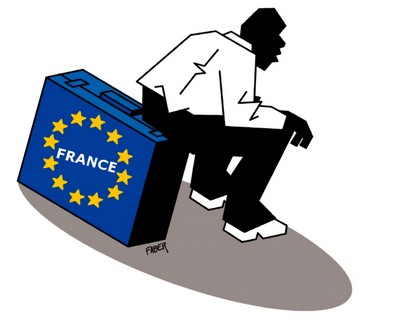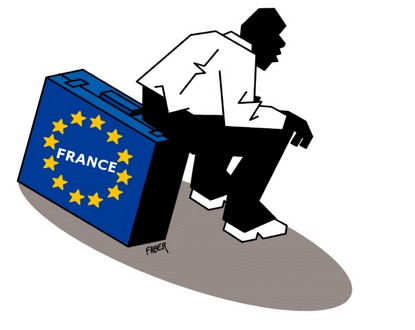We receive and publish this press release from the Liberté Chérie association, which stigmatizes immigration from an economic point of view. Beyond any other moral considerations and values of civilization, this theme has become central, for obvious reasons of political speculation, in the news and the ensuing debate.

So, is immigration a “cost” or does it present “good accounts” that make good friends?
Everyone will draw their own conclusions.
The Liberté Chérie Press Release
How much does immigration cost us…
While an article in today’s Figaro headlines that there are “up to seventy migrants (Tunisians) per day in the Nice region,” the Liberté Chérie Nice Côte d’Azur association recalls that it is us, the taxpayers, who pay the costs of immigration out of our own pocket.
In France, the State’s annual spending related to immigration amounts to 79.4 billion euros. This represents almost twice the annual interest on France’s debt (42 billion), at a time when the country is questioning ways to emerge from the crisis and reduce its debt.
The foreign-born community present on the metropolitan territory amounts to 7.7 million people, and currently, there are about 200,000 new entries to France each year, not to mention some 80,000 to 100,000 undocumented migrants.
Some revealing figures:
The general cost of social benefits paid to immigrants and their families was 549.6 (?) billion euros in 2007.
The annual spending related to integration amounts to 6.549 billion euros.
In the report prepared by Deputy Marie-Hélène des Egaux for the 2004 finance commission, the cumulative amount of asylum applications for the State represented a minimum of 900 million euros, based on 60,000 applicants, that is 15,000 euros per applicant.
The budget of the High Authority for the Fight against Discrimination and for Equality (HALDE) is 11.6 million euros.
The budget for State Medical Aid (AME), which concerns about 192,000 people, is 490 million euros (10% increase per year). The funding for French language courses costs 42.9 million euros.
Free legal aid amounted to 300 million euros in 2006 (about 5% of the justice budget).
Given the difficulties in executing deportations, France now favors voluntary return aid. The financial incentive for return used to be unattractive. The aid scales were increased on January 1, 2009: coverage of transportation for foreigners to their country of origin, payment of a grant of 3,500 euros for a couple, 2,000 euros for a single adult, 1,000 euros per minor child up to the third child, and 500 euros for each subsequent child. Nationals with a business project can also receive 7,000 euros to start their activity.
You can understand why everyone wants to come to France!
As Claude Guéant asserts, legal immigration must be reduced. As Eric Ciotti, President of the General Council of Alpes-Maritimes, rightly declares (cf. Le Parisien of April 8), each country must be able to “choose the number of foreigners it welcomes on its territory, and not endure this number.”
And we must close the numerous social taps. Let’s adopt an immigration policy similar to that of Canada where, to settle there, you must have a job beforehand, and those who immigrate can only rely on their own resources.
Someone wanting to settle in France should be motivated by what they will offer their host country and not what they will take from it.
Liberté Chérie
The Report from the University of Lille Research Team
Immigrants are a very good deal for the French economy: they receive 47.9 billion euros from the State but return 60.3 billion.
In other words, a positive balance of 12.4 billion euros for public finances, which only represents the monetary part of much larger transfers.
The 47.9 billion euros that immigration costs the State budget (2009) are broken down as follows (in billions of euros): pensions 16.3; housing aid 2.5; RMI (minimum income): 1.7; unemployment benefits: 5; family allowances: 6.7; health benefits: 11.5; education: 4.2.
In turn, immigrants return significantly larger amounts to the State budget through their work: income tax: 3.4; wealth tax: 3.3; consumption taxes and other taxes: 18.4; local taxes and others: 2.6; contribution to the social debt repayment (CRDS) and General Social Contribution (CSG): 6.2; social contributions: about 26.4 billion euros.
To this positive balance of some 12.4 billion euros, other revenues must be added, which are not always monetary but are of great social and economic importance: immigrants occupy the vast majority of jobs that the French do not want, and 90% of motorways were and are built and maintained with foreign labor.
Without immigrants, consumer prices (agricultural and other products) would be much higher, as foreign labor is paid significantly less.
The accounting carried out by the University of Lille researchers also highlights profound social changes. Immigrants, who are mostly young, are big consumers: they pay about 18.4 million euros to the State on their personal expenses, notably in VAT.
Professor Xavier Chojnicki comments on these results in these terms:
“It is a historical process linked to the structure of the immigrant population, mostly young.
As they are not highly qualified, immigrants are often unemployed. But they also spend a lot, and are very entrepreneurial.
The pensions that we pay to retirees are more than compensated for by consumption and social contributions that pay the younger among them, including some very dynamic people. We are witnessing the emergence of a small middle class from immigration.”


